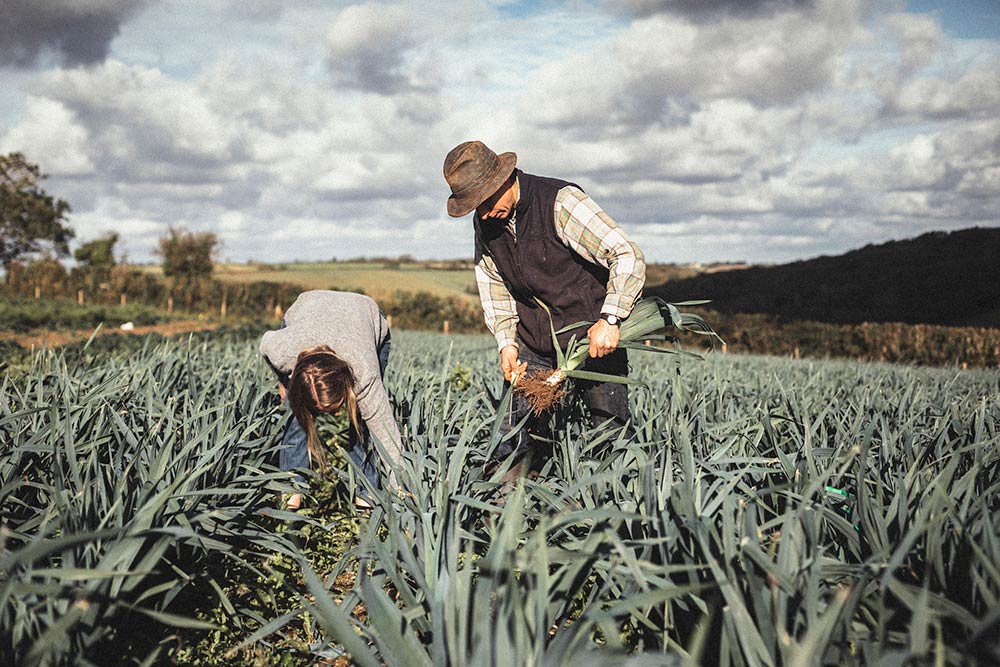It’s just the two of us working on the farm, along with some hired help from the co-op when needed, so sometimes we need to pick on the weekends. On Sunday we took our daughter out into the fields, where she helped stack leeks in the boxes. We were pulling them up by hand and were really amazed by the amount of worms and life in the soil. We believe it’s down to no spraying and the diversity you create by putting different root structures into the soil. Before veg, it was grass and the odd cereal crop, so there’s been a lot of different plants going in that field.
People talk about tilling as the most damaging thing for soil, but we feel artificial chemicals are just as bad. The more you look into glyphosate, the more you understand how it works, and it’s hard not to feel that it’s going to completely throw off the balance of soil health. More worrying is how the majority of the population doesn’t seem concerned about the artificial chemicals in their food.

There are nutrients in the soil that go into the vegetable that make it healthy. If you’ve got a lot of life and health in your soil, it makes sense that it produces a healthy vegetable. The more we do it, the more we feel that it’s the diversity of what you do on the farm that is key. We were never going to be able to do just one thing on this farm – the topography doesn’t suit it, for one thing. We’ve got lots of small fields, on uneven land, with lots of hedgerows and trees. As well as the veg, we have a herd of suckler cows, sheep, and we took over a horse livery business that Jake’s father has built up over 30 years.
It’s really frustrating when you hear people talk about removing livestock, when you’re really doing the job – not using animals on the land seems really counter-productive because you’d need to use chemical inputs instead. Conventional meat farming is so often fed on South American soy, or imported grain, compared to our grass-fed organic animals.
We also have a community-owned 4MW solar farm on the land, which generates renewable energy for the grid. How about that, grazing lambs underneath solar panels – surely that’s the most carbon positive lamb you can get?













Superb! Living near the M1 in north Derbyshire and travelling other local roads, there are solar panel fields left right and centre. I’ve always wondered what use could be made of the grass around them but never spotted any livestock. So here is the answer 🙂 Now, how do we make sure they all get used in this sensible way?
Couldn’t agree more about the glyphosate. I have been pestering councils about it for years but sadly not getting anywhere. Recenty read it’s been found in vast majority of Guinness samples tested. I persevere with my excellent Panasonic breadmaker to avoid it in bread at least.
Denby
Ps enjoyed a very tasty and feelgood lunch of Riverford minced lamb and veg today. Organic beans yesterday.
Jake and Leah, It sounds wonderful, what you are doing and I just wanted to pick up on the fact that you have some cattle and sheep. and I so agree with you about our need for animals on the land. The problem is intensive farming and consumers who are wasteful. I have stopped supporting extinction rebellion because of their stance on this subject and also for the demonstration on the tube train. for goodness sake people were using public transport as we are encouraged to. Any way all the best in your farming.
Years ago on tv there was a programme on agriculture. An old Essex farmer was being interviewed. He said “yes, I have a mixed farm. Out of fashion I know. But you’ve got to have animals- you can’t keep taking out of the soil and not putting back in. Don’t think all these chemicals do the stuff.” He’s long dead I expect- but he was so right. Well done Jake and Leah.